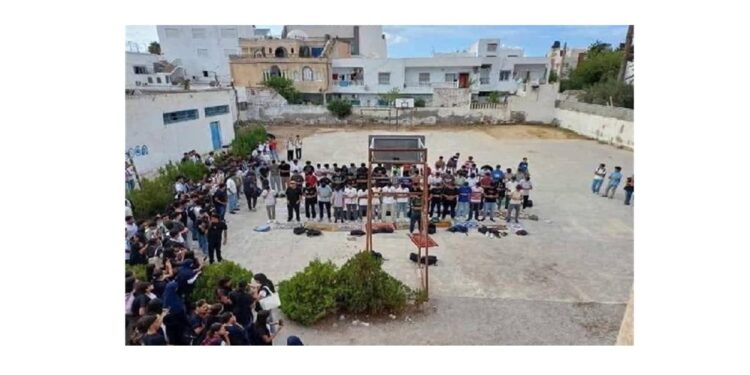The recent affair of the Mohamed Boudhina high school, in Hammamet-students praying on the basketball field-has reactivated an already old debate in Tunisia: should we authorize prayers in schools? Between the neutrality of the school, freedom of worship, political uses and the role of education, the lines of fracture reappear with acuity.
What happened in Hammamet
It all started from a morning when around forty students decided to pray collectively on the high school basketball field, in front of their surprised comrades. The director tried to intervene to dissuade them, but in return received a response full of fervor: “We cannot obey a creature and disobey the Creator. This earth belongs to God and does not belong to you ”. This slogan, filmed and widely shared on social networks, has instantly crystallized controversy.
Quickly, the debate turned into an injunction to choose a camp: supporters of a strictly neutral school space, or defenders of a right to express piety in schools to the point of forgetting the essential, the educational mission of the school. At the moment and while other countries are investing in artificial intelligence, Tunisia is bogged down in quarrels in the place of a prayer carpet.
However, no legal text explicitly deals with spontaneous collective prayer in the courses of a high school. The question therefore remains in a gray interpretation area: is it an act of religious expression (protected)? Or an activity outside the educational framework (likely to be restricted)?
Risks, tensions and instrumentalization
This file is part of a fabric of multiple tensions:
- Political instrumentalization: actors can use such events to stir up divisions, mobilize electoral bases or create persecution stories.
- Social pressure and religious conformism: even if some students do not wish to pray, the visibility of a group prayer can weigh moral pressure on others.
- Video and virality: images mounted in pin on social networks accelerate polarization, reducing nuances and encouraging radicalism.
- Educational emptiness: focusing the debate on questions of worship prevents focusing on the essentials – skills, training, innovation – while other education systems are advancing.
Institutional reactions
Nabeul’s regional secondary education union denounced “irresponsible behavior” and called for an investigation, while demanding better communication between administration, unions and students.
The OIPEM (International Organization for the Protection of Mediterranean children) requested an urgent reform of school regulations: compulsory signature of the pupils, visible display, presentation at the beginning of the year, greater involvement of parents. It underlines the vagueness on the freedoms of students in the face of the prerogatives of the administration.
The calls for “neutrality” of the school multiply, demanding that the educational space remains a protected place, where everyone – believing or not – can learn without feeling besieged.
Go beyond the conflict
A ministerial legal or circular text must clearly fix what is allowed or not in establishments (e.g. silent individual prayer, religious meetings outside the hours of course, etc.). This will avoid arbitrary interpretations.
It is necessary to train the heads of school, the teachers and the students in the principles of neutrality, freedom of conscience and tolerance.
Finally, the school must be replaced as a environment of learning, emancipation, debates and mutual understanding rather than ideological arena.
The Hammamet affair is not a simple local quarrel: it crystallizes deep issues on the meaning of the school, the place of the religious in public space and educational authority. It is not a question of denying the piety of the students, but of defining the limits of a shared space.
Should we pray at school? The answer cannot only be moral or emotional. It must be legal, educational, consensual. As long as we do not respond clearly, each incident revives the fracture.








